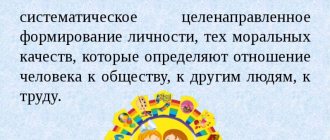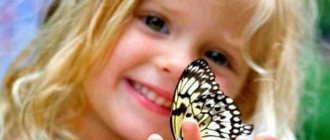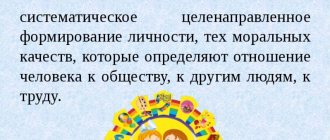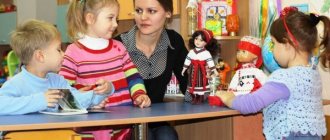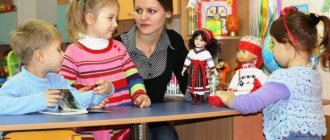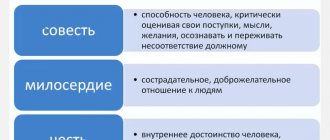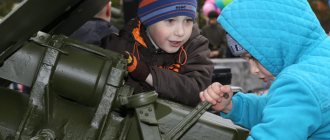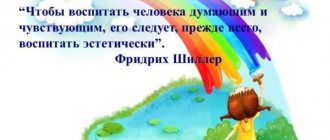Morality is a person’s internal attitude to act in accordance with conscience and free will, the individual’s internal requirements for himself. Morality is also understood as a set of norms of behavior for every person in society, the internal qualities of a person and their expression, which determine his behavior in society. Moral education is the process of forming a harmonious personality, developing a holistic value-semantic dominant in preschool children. Moral education is one of the most important stages in a child’s upbringing, necessary for his personal development in society. This process conveys to the child a system of generally accepted fundamental values that determine the relationships of people in society, in the family, as well as principles and norms based on the concepts of good and evil, truth and lies, positive and negative in a global sense. What are the main means and methods of moral education of preschool children? What is the role of moral education of preschool children in the family?
Main aspects of moral education of preschool age
The relevance of the problem of moral education is due to the crisis of modern society, in which there has been an erosion of moral norms, the importance of the institution of family, and spiritual values, which significantly complicates the path of personal development of a preschool child. Moral education is designed to contribute to the formation of a harmonious personality, aware of the norms and values that determine the foundations of relations between people in society.
The crisis of morality in society is facilitated by modern frivolous methods of raising children, in which the child receives the basics of moral education outside the family through means imposed by a demoralized society (for example, computer games that develop selfishness and cruelty).
Why should moral education begin at a very early age? During this period, the child is maximally open to emotional experience and empathy. The child takes the words and actions of adults for granted, without questioning them, which happens at an older age when the child learns to analyze words and actions, compare experiences and draw certain, not always correct, conclusions. The experience acquired by young children will later move into the category of what is proper, true, canonical, and beyond doubt.
Moral education in preschool age is implemented through a system of methods and means, but the main source of moral education and the formation of a harmonious personality of a child is his family. An auxiliary mechanism for the implementation of moral education of preschool children are kindergartens, whose role is to correct errors in raising a child in the family.
Methods and forms of spiritual and moral education of preschoolers; methodological development
Municipal autonomous preschool educational institution
"Kindergarten No. 74 in Kaliningrad
Forms and methods of spiritual and moral education
preschoolers in MADOU d/s No. 74
(as part of the program implementation
"Origins on sociocultural experience")
Prepared by:
Teacher of the highest qualification category: Gulyaeva Lyudmila Viktorovna
Kaliningrad
2020
Let the child feel the beauty and admire it, let the images in which the Motherland is embodied be forever preserved in his heart and memory.
V. A. Sukhomlinsky.
Preschool childhood is an important period in a child’s life, when a sense of their own capabilities, the need for independent activity, basic ideas about the world around them, good and evil in it, ideas about family life and their native land are formed. We live in a time when the child’s environment is oversaturated with digital sources of information, which has a detrimental effect on the development of moral foundations in society. The child must acquire moral guidelines in a technically and materially saturated environment. That is why, instilling in a child moral and spiritual values is one of the urgent tasks of preschool education. Currently, this area of work for teachers is actively developing, including new methods for developing children’s personal qualities.
Early childhood is the time to effectively establish value guidelines in life.
The goal of spiritual and moral education in a preschool institution is to develop in children a humane attitude towards the world around them.
The following moral tasks are implemented in preschool educational institutions:
- To develop the ability to empathize in children;
- Instill respect for one’s own nation and for representatives of other nationalities;
- Foster love for home and family;
- Acquiring knowledge about the culture and history of the native country;
The tasks of spiritual and moral development are implemented within the framework of the following educational areas:
- Spiritual and educational direction (classes, reading to children, conversations, oral teachings, discussion of actions, etc.);
- Educational and health-improving areas (holidays, outdoor games, physical education, walks);
- Cultural and educational direction (concerts, watching films and cartoons, listening to audio recordings, participating in holidays and entertainment);
- Moral and labor direction (self-service work, making gifts, attributes for games).
This is not the first year that our preschool educational institution has been working on the spiritual and moral education of children of all age categories. In April 2022, our kindergarten is a supporting platform for the spiritual and moral education of preschoolers. The work is carried out according to the program “Origins on sociocultural experience”.
The purpose of our work is:
- Preserving the spiritual and moral health of children. Introducing them to the moral and spiritual values of Orthodox culture.
- Studying the history, culture, natural and ecological uniqueness of the native land, Russia.
- The desire to revive the traditions of family education.
In order to achieve our goal of spiritual and moral education, we face the following tasks
- Create the necessary conditions in preschool educational institutions for organizing work on spiritual, moral, patriotic education.
- Increase the professional level of teachers.
- Provide the educational process with the necessary fiction and pedagogical literature.
- Orient the family towards the spiritual and moral education of children (familiarizing parents with the basics of Orthodox pedagogy and psychology, forming ideas about the forms of traditional family life.)
Objectives of the educational system:
- Development of moral consciousness, feelings, behavior of the child.
- Formation of the emotional-volitional sphere of the personality of a preschooler.
- Development of social skills and behavioral skills.
- Cultivate a positive attitude towards the world.
To achieve the set goals for the spiritual and moral education of children, our preschool educational institution had a subject-spatial environment.
- Creation of a mini-museum of decorative and applied arts “Gornitsa”;
- Creation of a mini-museum of folk-patriotic direction “Where the Motherland Begins!”
- Creation of the Center for Family Spiritual Development “Faith, Hope, Love”;
In each age group, small zones of spiritual and moral, as well as national patriotic education are allocated; There are materials for moral development: books on the topic of friendship and family, story-based posters and pictures about one’s hometown and country.
Forms and methods of work on the spiritual and moral education of preschool children in MADOOU d/s No. 74:
- Direct educational activities (DEA);
- Game activity;
- Labor activity;
- Reading fiction;
- Interaction with society;
- Project activities;
- Club work;
- Interaction with parents;
- Off-duty activities.
GCD
Systematic educational activities are an important means of educational work with children of all age categories. During classes, children, together with the teacher, study fairy tales, poems and stories, discuss people’s actions and character traits. In accordance with the age of the pupils, our preschool educational institution constantly conducts conversations in which children get acquainted with situations in which certain moral qualities of a person may manifest themselves. Much attention is paid to reading fiction, watching presentations, films and television shows. By introducing children to the world around them, we try to cultivate love and respect for nature. Integrated GCDs can be organized around a variety of topics.
Reading fiction
Works for joint reading with preschoolers always contain an element of moral education. Reading works of fiction makes children empathize with the characters and gives them the opportunity to appreciate the character’s good deed. Parallel viewing of illustrations to works helps children quickly understand the meaning of the emotional content of the characters.
Labor activity
Morality is cultivated by involving children in labor actions: helping within their means in general cleaning in a group, on the veranda in mini-museums, at clean-up days. Gift-making activities: crafts, postcards for various holidays and events contribute to the development of respect for manual labor.
Play activity
Play is undoubtedly the leading activity of a preschooler. It is through play that a child learns about the world and prepares for adult life. The game is based on the perception of the presented rules, thereby orienting the child to adhere to certain rules of adult life. The child absorbs lifestyles and strives to imitate the actions of adults. Mental and thinking abilities are developed through gaming activities. Moral norms are actively absorbed by children in play activities.
Moral games with objects are held with children of primary preschool age (1.5-4 years). The teacher acts as a partner and develops play activities and includes a moral aspect in the content of the game. By the age of 5 years, the ability for role-playing games is formed. Children actively interact with each other, they like to try on different roles. In moral role play, children are encouraged to act within social or literary roles that introduce moral values.
As part of moral education, didactic games are actively carried out, the material for which is illustrations based on familiar fairy tales, series of plot pictures, poetic texts, etc.
Games are played both in groups and outdoors.
Cooperation with society
Our kindergarten actively cooperates and interacts with public organizations in Kaliningrad:
- GUK COM "Art Gallery";
- Kaliningrad Regional Puppet Theater;
- Regional Children's Library named after. A. Gaidar;
- Children's music school named after. Gliere;
- Artist's House;
- City Park of Culture and Recreation";
- Municipal educational institution secondary school No. 14;
- GAUKO DO “Kaliningrad Regional Children and Youth Center for Ecology, Local History and Tourism.
Club work
In our preschool educational institution, circle work is constantly carried out with children of different age groups. Classes are carried out in accordance with the chosen program of additional education. There are several areas of circle activity.
- Circle “Wonders of Nature” (cognitive development). The circle has an environmental focus. By studying in a circle, children enrich their knowledge base with new in-depth knowledge about natural phenomena.
- “Healthy” circle (physical development)
- Club “Visiting a Fairy Tale” (artistic and aesthetic development).
Club work, which is carried out with children in various directions, actively overlaps with the work that is carried out in order to develop the spiritual and moral qualities of pupils.
Project activities
The project method involves the use of a variety of teaching tools and techniques, as well as the need to integrate various types of knowledge and skills. The project method is relevant and very effective. It gives the child the opportunity to experiment, synthesize acquired knowledge, and develop creative abilities. Mandatory components of the project: children's independence, co-creation of children and adults, development of communication abilities, application of acquired knowledge in various types of activities. The project consists of several stages. The first stage is determining the topic, type of project, goals and objectives become. The second stage is preliminary work (conversations, observations, excursions, reading literature). The third stage is the practical part (experiments, games, artistic and productive part, creation of collections). The fourth stage is working with parents. The final stage is the result of project activities.
Interaction with parents
One of the most important tasks of a kindergarten in spiritual and moral education is to establish a close connection with the family. Family and preschool are two important institutions for the socialization of a child. Working with parents includes:
- Meetings on spiritual and moral topics;
- Open classes of the educational process;
- Questions and answers evenings;
- Questioning and testing;
- Involving parents in the preparation and holding of holidays and open classes;
- Excursions;
- Individual and group consultations;
- Visual types of work;
- Carrying out joint events;
- Involving parents in feasible work to improve the territory of the preschool educational institution.
The main goal in working with families is to achieve unity in raising a child.
Off-duty activities
Extra-curricular activities in spiritual and moral education are carried out through 2 directions - entertaining and educational. Entertainment in kindergarten includes various forms of leisure: holidays, performances, folk entertainment, creative evenings and master classes. Various types of children's activities will be combined in entertaining forms: pupils dance, sing, make something, and participate in competitions. Educational activities include excursions, hikes, etc.
Currently, as part of the implementation of the Concept of spiritual and moral development and education of pupils, the following events have been organized and carried out in our MADO kindergarten No. 74:
- Conducting a seminar “Family and kindergarten - a single educational space” (2018).
- Conducting a master class (on the basis of the Center for Children's Recreation, kindergarten No. 105) Traditional folk doll “Easter Dove” (2018);
- Celebration of the Nativity of Christ in kindergarten (annually);
- Conducting a regional seminar “Spiritual and moral education of preschool children” (2019);
- Carrying out an entertainment event with elements of theatrical activity “Folk Game Day”;
- Carrying out entertainment events dedicated to major Orthodox holidays;
- Project activities on spiritual and moral education are regularly carried out.
- Every year, teachers from our preschool educational institution take part in the scientific and practical conference “At the Origins of Creativity.”
Spiritual and moral education should be perceived as an integral system of means and techniques for the development of children. The work of a teacher in developing moral qualities in every child extends beyond the boundaries of kindergarten. The teacher actively interacts with parents - family values are restored and strengthened. Preschoolers’ ideas about the meaning of morality in people’s lives are expanding. The formation of humanists and patriots begins in early childhood, and the main guides are the family and kindergarten.
Basic methods of moral education of preschool children
Moral education of preschool children is a complex process of forming the child’s beliefs and value system, implemented through certain methods, which include:
- Persuasion and Conversation;
- Inspiration to action;
- Appeal to sympathy and empathy;
- Encouragement;
- Punishment.
At preschool age, the child does not yet understand what is good and what is bad, but he is maximally open to the emotional perception of the situation. Therefore, in the early period of moral education of preschoolers, standard methods are ineffective.
Many parents, in the process of educating morality in a child, assign the main role to the mechanisms of reward and punishment, incorrectly interpreting these methods, reducing them to material reward and physical punishment or material deprivation. As practice shows, this tactic is also ineffective in the long term, since physical and material deprivation is a manifestation of external moral control for preschool children. Moral education is designed to stimulate the manifestation of internal encouragement (oneself) and internal deprivation (punishment - unauthorized refusal of encouragement, benefit).
Basic means of moral education of preschool children
The thinking and ideas of a preschool child, whose moral education is realized through a certain system of means, are extremely concrete, so they need clear, understandable forms and symbols to understand such abstract concepts of moral principles as kindness, loyalty, gratitude, responsiveness, love, beauty and others. Among the main means of moral education of preschoolers are:
- Fairy tale;
- A game;
- Creative task, labor, human activity;
- Nature;
- Communication with both peers and adults;
- The collective - the children's environment - is one of the important means of moral education of preschoolers, allowing the child to develop and express his individuality within the framework of a specific society governed by its own laws and norms. This is one of the necessary mechanisms for instilling collectivism, which cannot be realized in any other conditions. The harmonious development of the individual is impossible without a team, since a person is a social being, living in society and being part of it. Raising collectivism in a child must inevitably overcome the contradiction - the suppression of the individual by the collective. Overcoming this problem independently will allow the child to learn to live and develop in society within the generally accepted framework of norms and morality.
These means of developing morality in a child are accessible and easily applicable in practice, both in the conditions of raising a child in a kindergarten and in the family.
Examples of activities with preschoolers
The spiritual and moral education of preschool children within the framework of the Federal State Educational Standard in practice consists of successive classes, practices, and techniques. They are applicable both at home and in groups at a preschool institution.
Lesson "Family"
The teacher prepares handouts, compiles a questionnaire and organizes the children. After the introduction, the teacher asks the children questions about their parents, brothers or sisters. The teacher tells children about the importance of family, adjusting the information based on age.
Children dance in a circle and then sit on chairs. The teacher shows the children animal cards. Children guess who is whose mother. Completion of the lesson: after the teacher’s question, the children tell what they are called at home, what affectionate names they know.
Spring forest
This lesson introduces primary schoolchildren to the names of trees and natural features. At the beginning of the lesson, the teacher suggests going to the spring forest, but says that this will require using your imagination.
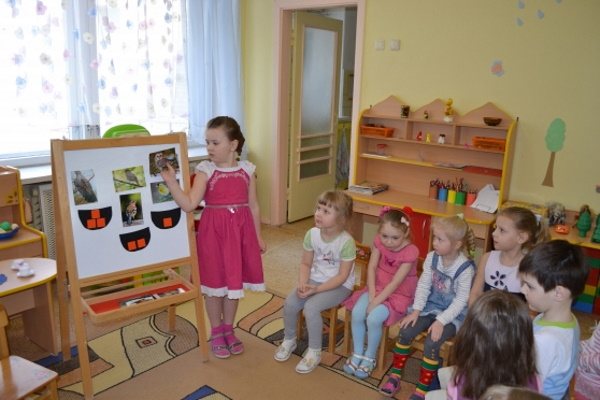
Lesson “Journey to the spring forest”
Children move to a location decorated with decorations and auxiliary materials. The teacher points to the models one by one and asks the children to name what they see. It is convenient to use a forester doll in this lesson, who will talk about the forest and give tasks.
Examples of tasks:
- draw a dandelion;
- remember the poem about spring;
- solve riddles;
- Bring the forester the objects he describes.
At the end of the lesson, the forester thanks the children for their knowledge and help. Separately, he gives a lecture on how important it is to protect the forest and appreciate nature.
Know yourself
The lesson is based on associative techniques. Analogies can be different designs, but it is most convenient to use the example of the structure of a car and the human body.
The teacher demonstrates the machine to the children, shows it in cross-section and asks them to say what the machine cannot work without. Children should gradually conclude that the car needs gasoline. The teacher draws an analogy with a person, tells how blood flows, asks to say what a person cannot live without.
The result of the lesson should be the formation of simple analytical thinking when children learn:
- compare animate and inanimate objects;
- draw analogies;
- take tasks not literally, but learn to reason and think abstractly.
Depending on the age of the children, you can ask arguments on different topics, supplementing it with more complex examples.
Fish
An interesting activity that introduces children not only to the characteristics of fish, but also teaches how to treat them with care. An aquarium is required for this activity. The teacher asks the children to formulate their questions for the fish and ask them through the wall of the aquarium.
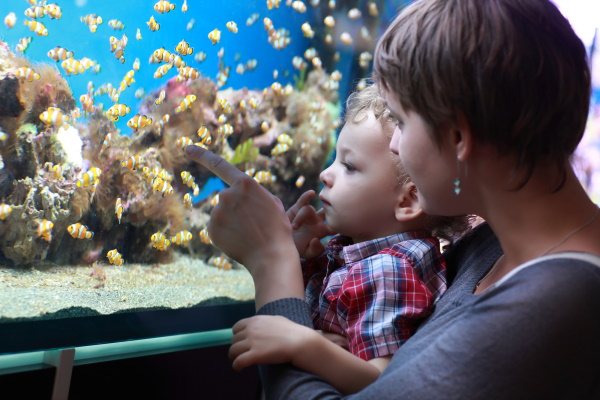
Children must conclude that fish cannot talk. Then the teacher reads a letter on behalf of the fish, where it asks riddles and talks about its characteristics: the structure of the body, the presence of a tail, scales.
Integrated lesson “Water”
For the lesson you will need auxiliary materials: dolls and small basins of water.
First, the teacher conducts language and articulation gymnastics, where he asks the children to alternately touch their eyes, nose, ears, and forehead. Then he talks about how important it is to wash your face morning and evening. The cartoon “Moidodyr” can serve as demonstration material.
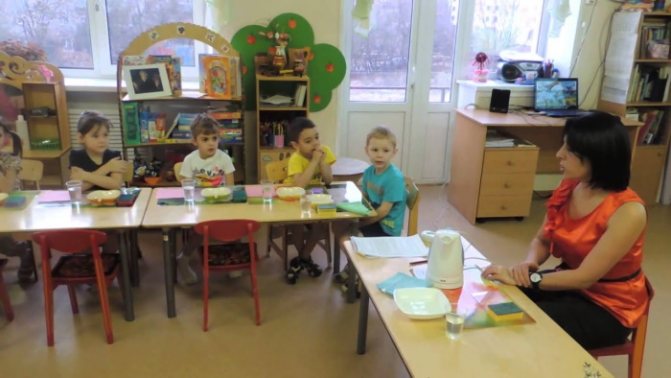
After this, the children, at the teacher’s command, begin to wash their dolls. They help each other in the process. The final stage is reading poetry, accompanied by active motor actions.
The teacher talks about how important water is for a person, what needs to be done to learn how to save resources , how it is customary in society to take care of nature in order to keep rivers and lakes clean.
The role of moral education of preschool children in the family
The fundamentals of moral education of preschool children are implemented in the context of the family. A child, like a little imitator of adults, copies the behavior of his parents, adopts their tactics of dealing with each other and with other people in society. Parents should realize that it is impossible to raise a harmonious, highly moral personality in an unhealthy family atmosphere in which disrespect, selfishness, laziness, and deception prevail.
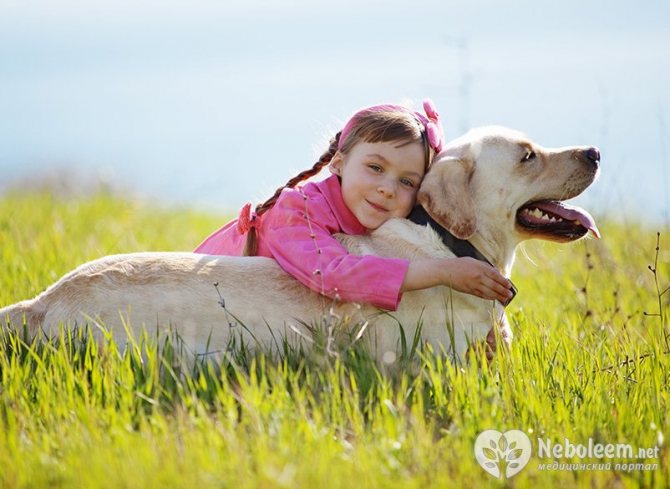
The family is the main environment for a child to gain experience and knowledge. Kindergartens and other educational institutions are intended only to correct the mistakes parents made in raising preschool children. The moral education of a child in the family must be implemented with maximum respect for his personal dignity. The formation of a child’s moral behavior should not be accompanied by the suppression of his initiative and the manifestation of personal qualities.
For a preschool child, moral education is implemented through the prism of family relationships, which should become that natural role model, by inheriting which the child could become a moral member of society.
For a preschool child, moral education in the family is the basis for the development of his personality.
Psychological aspect
Raising children is inextricably linked with psychological concepts. How a child’s cognitive skills and abilities are formed is an important component of the entire process of learning and upbringing.
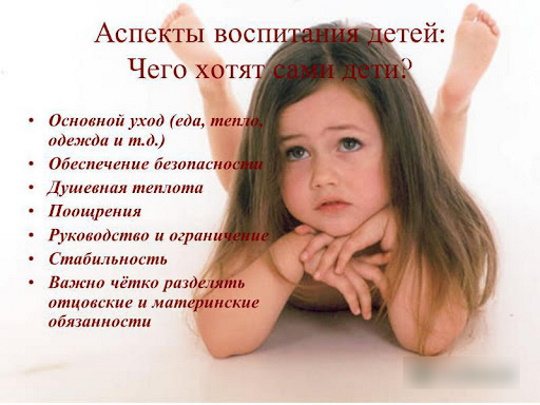
From a psychological point of view, the approach to preschoolers should be based on the following principles:
- patient attitude towards the individuality of each participant;
- understanding the child’s characteristics;
- accepting the child's characteristics.
The preschool period is the most important part of childhood, which is closely related to the instability of emotions in children, incomplete understanding of their role and requirements for behavior.
A set of techniques and techniques that are used in preschool institutions helps children understand which forms of communication are sustainable and which are undesirable in society or the family.
